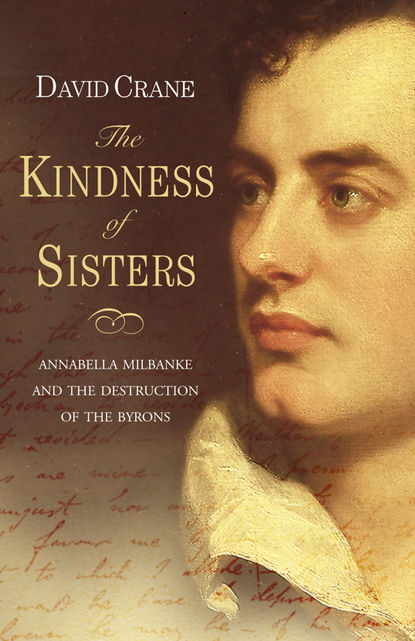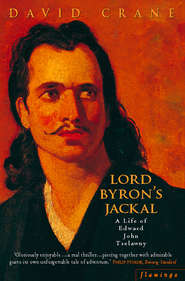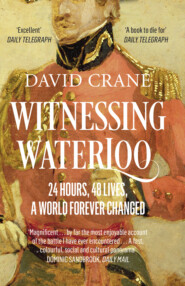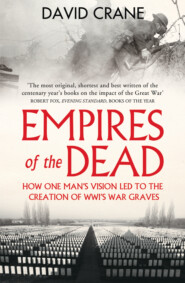По всем вопросам обращайтесь на: info@litportal.ru
(©) 2003-2024.
✖
The Kindness of Sisters: Annabella Milbanke and the Destruction of the Byrons
Настройки чтения
Размер шрифта
Высота строк
Поля
(#litres_trial_promo) alone could touch her heart, but no amount of dissembling to her parents or herself could disguise the fact that curiosity was rapidly turning into the crusade that would shape her whole life. ‘Do you think there is one person here who dares to look into himself?’, she later recalled the question that had inspired her first mute ‘offering’ at the shrine of Childe Harold,
… I felt that he was the most attractive person; but I was not bound to him by any strong feeling of sympathy till he uttered these words, not to me, but in my hearing – ‘I have not a friend in the world!’ It is said that there is an instinct in the human heart which attaches us to the friendless. I did not pause – there was my error to enquire why he was friendless; but I vowed in secret to be a devoted friend to this lone being.
(#litres_trial_promo)
There is something unsettling in the reveries of the young Anna-bella, or at least in her incapacity to see them for what they were. The descriptions of Byron that litter her diary and letters are as banal as those of anyone else that season, but running through them is that old and dangerous sense of election, the conviction of some private and silent understanding that set her apart in a city swept along on the rhythms of the waltz and the voyeuristic thrill of Caroline Lamb’s pursuit of Byron.
If there was nobody to blame for these delusions but Annabella, however, it is clear that she had not just imagined Byron’s interest in her. In the wreck of their marriage she once accused him of only ever wanting what he could not have, but if there is something in that, the more brutal truth is that he simply could not see her for what she was – could not see the provinciality that passed for independence, the rigidity latent in her strength, the narrowness which, with the nostalgia of the jaded sophisticate, he wistfully put down to moral superiority. ‘I set you down as the most puzzling person there’, he later told her of the first time he had seen her, across a room full of morning-visitors at Melbourne House,
For there was a quiet contempt of all around you & the nothings they were saying & doing in your manner that was so much after my own heart. There was a simplicity – an innocence – a beauty in your deportment & appearance which although you hardly spoke – told me I was in company with no common being.
(#litres_trial_promo)
As the spring of 1812 wore on, and Byron’s life drifted dangerously and publicly into the chaos of his notorious affair with Caroline Lamb, it was not so much what Annabella was as what she was not that attracted Byron. The kinds of virtues and solidity with which he invested her would always hold a theoretical attraction for him, but it is hardly an exaggeration to say that if there had been no Caroline Lamb to escape then there would have been no marriage to her cousin, Annabella.
Byron had first come across Caro Lamb, the twenty-seven-year-old, fragile, androgynous-looking child wife of William Lamb, when she had written to him under a thin veil of anonymity after the triumph of Childe Harold in February 1812. Even before she had set eyes on him she had declared that she would know its author if he was ‘as ugly as Aesop’
(#litres_trial_promo), and within weeks of meeting she had made sure their affair was public property, played out with a kind of arriviste relish on his part and on hers with a reckless exhibitionism hovering on the edge of insanity.
There is not a moment of an affair that defined and caricatured the Romantic passion in all its delinquent intensity that has not been raked over a hundred times, but in the context of his relationship with Annabella it still has its place here. In later years Byron came to hate Caroline with a passion that only Claire Clairmont could otherwise inspire, but in its first weeks at least what attracted him to the maddest of all the Spencers was precisely the wayward and uncontrollable element in her that he eventually came to loathe.
There was a wonderfully sane and balanced side to Byron that would always in the end tire of romantic excess, and yet after the initial excitement had passed something more than boredom turned him against Caroline Lamb. An illicit element to some of his earlier, male relationships had sometimes unnerved him, but as he tried to distance himself from Caroline he found himself contending with a woman ready to call the Childe’s bluff, to live out the implications of his Romanticism with a patrician contempt for convention that in his first year of success he had neither the courage nor the confidence of ‘belonging’ to match.
Even with the contrast of Caroline Lamb to concentrate his mind, it is unlikely that his interest in Annabella would ever have quickened into anything more important had it not been for the intervention of her aunt (Caroline Lamb’s mother-in-law), Lady Melbourne. By the time that Annabella made her London debut, the girl in Stubbs’s portrait had reigned as the‘spider queen’ of Whig society for over a generation, ‘a sort of modern Aspasia’ with the brain and morals to match, tolerant, attractive, intelligent, cynical, corrupt and – to Byron at least – ‘the best, the kindest, and ablest female I have ever known, old or young’. ‘She was a charming person’, he later told Lady Blessington,
uniting the energy of a man’s mind with the delicacy and tenderness of a woman’s. She had all of philosophy, save its moroseness, and all of nature, save its defects and general faiblesse … I have often thought, that, with a little more youth Lady M. might have turned my head, at all events she often turned my heart, by bringing me back to mild feelings, when the demon passion was strong within me. Her mind and heart were as fresh as if only sixteen summers had flown over her, instead of four times that number – and the mind and heart always leave external marks of their state of health. Goodness is the best cosmetic that has yet been discovered … She was a captivating creature, malgre her eleven or twelve lustres, and I shall always love her.
(#litres_trial_promo)
Even in her early sixties, the ‘spider’ or the ‘thorn’ still retained the power, desire and intelligence that had once made her the mistress of Lord Egremont and the Prince of Wales. As a young bride she had been forced to stand and watch her husband’s ludicrous pursuit of the actress Sophia Baddeley, but with the ambition and purpose Stubbs caught so well, disappointment had simply deflected her energies into the ruthless pursuit of family influence that was to consume the rest of her life. ‘The charms of her person and the endowments of her mind were worthy of a better fate than that she was preparing for herself’, Caroline Lamb wrote savagely of her in Glenarvon, the roman à clef with which she took her revenge not just on Byron but on the Whig world that had turned its back on her,
But, under the semblance of youthful gaiety, she concealed a dark intriguing spirit, which could neither remain at rest, nor satisfy itself in the pursuit of great and noble objects. She had been hurried on by the evil activity of her own mind, until the habit of crime had overcome every scruple, and rendered her insensible to repentance, and almost to remorse. In this career she had improved to such a degree her natural talent of dissimulation, that, under its impenetrable veil, she was able to carry on securely her darkest machinations; and her understanding had so adapted itself to her passion, that it was in her power to give, in her own eyes, a character of grandeur, to the vice and malignity, which afforded an inexplicable delight to her depraved imagination.
(#litres_trial_promo)
With daughter and mother-in-law both living in Melbourne House, a delicate balancing act was required, but from the moment Byron tried to extricate himself from the affair with Caroline, he found Lady Melbourne a subtle and determined ally. To a woman who had charmed and slept her way to the top of Whig society, her daughter-in-law’s morals were of no great concern, but the one crime the lax Regency world would not forgive was indiscretion and as Caroline’s antics began to threaten the dynastic ambitions ‘the spider’ held for her family, Lady Melbourne moved to neutralise her.
In spite of all her cynicism, though, it can no more have occurred to Lady Melbourne than it had to Byron that the solution to their mutual problem lay in her cool, self-contained country niece. For their different reasons both Caroline Lamb and her sister-in-law ‘Caro George’ had done their best to convince him that Annabella was already engaged, but he had hardly needed their warnings to keep a wary distance from a woman he instinctively recognised as his opposite. ‘My dear Lady Caroline’, he had written as early as 1 May, after reading some verses of Annabella’s,
I have read over the few poems of Miss Milbank with attention. – They display fancy, feeling, & a little practice would very soon induce facility of expression … She certainly is a very extraordinary girl, who would imagine so much strength & variety of thought under that placid countenance? You will say as much of this to Miss M. as you think proper. – I say all this very sincerely, I have no desire to be better acquainted with Miss Milbank, she is too good for a fallen spirit to know or wish to know, & I should like her more if she were less perfect.
(#litres_trial_promo)
There is no reason to doubt Byron – Annabella is not mentioned in his letters for more than four months – but the idea of her had taken a dogged hold of his imagination. There was no pretence on his part that he was in love with her, or anyone else, but as over July and August the pressure from both the Lambs and Caroline’s mother to end the affair grew, he was faced with the fundamental need of the outsider to assimilate or face destruction. ‘I see nothing but marriage & a speedy one can save me’, he wrote to Lady Melbourne on 28 September,
if your niece is attainable I should prefer her – if not – the very first woman who does not look as if she would spit in my face.
(#litres_trial_promo)
‘You ask “if I am sure of myself”’ he had already written to Lady Melbourne ten days earlier, after first hesitantly broaching the idea of Annabella to her in a letter from Cheltenham on the 13th,
I answer – no – but you are, which I take to be a much better thing. Miss M. I admire because she is a clever woman, an amiable woman & of high blood, for I still have a few Norman & Scotch inherited prejudices on the last score, were I to marry. As to Love, that is done in a week (provided the Lady has a reasonable share) besides marriage goes on better with esteem & confidence than romance, & she is quite pretty enough to be loved by her husband, without being so glaringly beautiful as to attract too many rivals.
(#litres_trial_promo)
At the beginning of October Lady Melbourne approached her niece on his behalf, and on the 12th received Annabella’s refusal from Richmond, complete with a ‘Character’ of Byron explaining her decision. ‘The passions have been his guide from childhood,’ she wrote, up on her ‘high stilts’ as her aunt described her,
and have exercised a tyrannical power over his very superior intellect. Yet among his dispositions are many which deserve to be associated with Christian principles – his love of goodness in its chastest form, and his abhorrence of all that degrades human nature, prove the uncorrupted purity of his moral sense.
There is a chivalrous generosity in his ideas of love and friendship, and selfishness is totally absent from his character. In secret he is the zealous friend of all human feelings; but from the strangest perversion that pride ever created, he endeavours to disguise the best points of his character. When indignation takes possession of his mind – and it is easily excited – his disposition becomes malevolent. He hates with the bitterest contempt; but as soon as he has indulged those feelings, he regains the humanity which he had lost – from the immediate impulse of provocation – and repents deeply.
(#litres_trial_promo)
It is difficult to be sure of Byron’s real feelings at this rejection, or even whether he knew himself, but whatever they were he would never have dropped the tone of cool worldliness with Lady Melbourne that had become their common language. ‘Cut her! My dear Ly. M. marry – Mahomet forbid!’ – he wrote to her on receiving the news, anxious to allay any suspicion of resentment,
I am sure we will be better friends than before & if I am not embarrassed by all this I cannot see for the soul of me why she should – assure her con tutto rispetto that The subject shall never be renewed in any shape whatever, & assure yourself my carissima (not Zia what then shall it be? Chuse your own name) that were it not for this embarras with C I would much rather remain as I am. – I have had so very little intercourse with the fair Philosopher that if when we meet I should endeavour to improve our acquaintance she must not mistake me, & assure her I never shall mistake her … She is perfectly right in every point of view, & during the slight suspense I felt something very like remorse for sundry reasons not at all connected with C nor with any occurrence since I knew you or her or hers; finding I must marry however on that score, I should have preferred a woman of birth & talents, but such a woman was not at all to blame for not preferring me; my heart never had an opportunity of being much interested in the business, further than that I should have very much liked to be your relation. – And now to conclude like Ld. Foppington, “I have lost a thousand women in my time but never had the ill manners to quarrel with them for such a trifle.”
(#litres_trial_promo)
The address on this letter – Cheltenham again – suggests, though, that Byron’s good humour was not simply feigned for Lady Melbourne’s benefit. He had gone to the fashionable spa town for the waters earlier in the summer, but long after it had been abandoned by most of London society he was still there, held by a growing fascination with that other ‘Aspasia’ of Regency England that he would have been reluctant to admit to Lady Melbourne, the beautiful, serially faithless forty-year-old Countess of Oxford, Jane Harley.
There is as much pseudo-psychological nonsense talked of Byron’s predilection for older women – as if everyone over the age of thirty were somehow identical – as there is over his fastidious distaste at the sight of a woman eating.
(#litres_trial_promo) In the wake of Childe Harold it was inevitable that he should gravitate towards the great hostesses who dominated Whig society, but among even that disparate group it would be hard to imagine two women with less in common than Lady Melbourne and Lady Oxford, the one all caution, cynicism, and dynastic ambition, the other generous, impulsive, radical and careless of the proprieties she had so successfully defied from the first loveless years of marriage.
The daughter of a clergyman, Jane Scott had been born in Inchin, and at the age of twenty-two ‘sacrificed’, as Byron later told Medwin, ‘to one whose mind and body were equally contemptible in the scale of creation’
(#litres_trial_promo). If Lord Oxford had never been much of a match for his dazzling and ambitious wife, however, he was no gaoler either, and by the time that she began her affair with Byron the ‘grande horizontale’ of Whig political radicalism was already the mother of five children by as many fathers, ‘a tarnished siren of uncertain age’, as Lord David Cecil described her with patrician distaste,
who pursued a life of promiscuous amours on the fringe of society, in an atmosphere of tawdry eroticism and tawdrier culture. Reclining on a sofa, with ringlets disposed about her neck in seductive disarray, she would rhapsodise to her lovers on the beauties of Pindar and the hypocrisy of the world.
(#litres_trial_promo)
Byron had first met her during the London season, but it was at Cheltenham and then at Eywood, the Oxfords’ country house in Herefordshire, that their friendship developed into the infatuation that absorbed him for the next six months. ‘She resembled a landscape by Claude Lorraine’, Lady Blessington – no ingenue herself – recalled him saying,
‘with a setting sun, her beauties enhanced by the knowledge that they were shedding their last dying beams, which threw a radiance around. A woman (continued Byron) is only grateful for her first and last conquest. The first of poor dear Lady [Oxford’s] was achieved before I entered on this world of care, but the last I do flatter myself was reserved for me, and a bonne bouche it was.’
(#litres_trial_promo)
It is impossible to imagine Byron speaking of Lady Melbourne in this tone, but if Lady Oxford never exerted the same dominance over him as the ‘spider’ had done, in the sensual and intellectual licence of the ‘bowers of Armida’
(#litres_trial_promo), as he labelled Eywood, he found a retreat from any fleeting disappointment at Annabella’s rejection and the continuing assaults of Caroline Lamb. ‘I mean (entre nous my dear Machiavel)’, he had written to Lady Melbourne,
to play off Ly. O against her, who would have no objection perchance but she dreads her scenes and has asked me not to mention that we have met to C or that I am going to E.
(#litres_trial_promo)
‘I am no longer your lover’, he wrote to Caroline herself, as good as his word, if the letter she reproduced in Glenarvon is the faithful copy of Byron’s that she claimed it to be,











